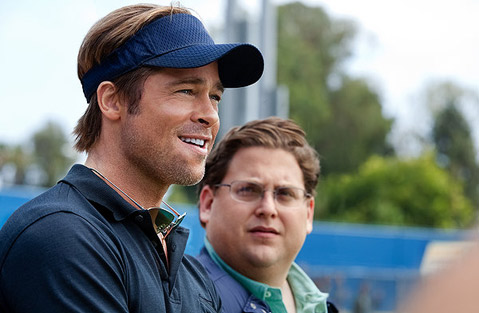Moneyball
Brad Pitt, Jonah Hill, and Philip Seymour Hoffman star in a film written by Aaron Sorkin and Steven Zaillian, based on the book by Michael Lewis, and directed by Bennett Miller.

As baseball movies go, Moneyball plays ball in a refreshing, behind-the-scenes way, befitting its underlying theme of American maverick thinking. The story follows Oakland A’s general manager Billy Beane and his radical new concept for creating a winning team in the early ’00s, an era when money had nearly spoiled the game. Working with a limited budget, Beane enlisted the help of a Yale economics student to let stats and computer savvy build a winning team, and the experiment nearly worked wonders.
Beane, played here by Brad Pitt, is the archetype of the outside-the-box American hero, working around a systemic problem by breaking and remaking the rules, bucking the system with an “adapt or die” philosophy. To its credit, the film tells an industry-modeled story in a vivid way, accentuating the idea that the sports biz — and business in general — can have dramatic arcs similar to the sporting life. Along the way, we get flashback and sideline glimpses into Beane’s own past as both a would-be baseball star and as a divorced family man whose relationship with his young daughter guides him almost as much as his obsessive, occupational drive to win.
As an actor, Pitt has a higher batting average this time around, by his usual low standards, but seems to have spent considerable time studying the affect and mannerisms of Robert Redford, whom he uncannily mimics here. Jonah Hill moves nicely beyond and above his usual sex-and-hedonist shtick, and Philip Seymour Hoffman plays against his typical offbeat type, as the gruff, crew-cut coifed, and individualistic A’s coach who repeatedly comes head-to-head with the formula-bending manager.
By the time Moneyball does get to the meat of the on-field action, deep into the story, things start going haywire, continuity- and style-wise. We’re drawn into sports sequences both adrenaline-manipulative and dreamy-glazed, tapping into the “baseball as Zen exercise” dynamics of The Natural and Field of Dreams. Suddenly, the naturalistic leanings of much of the film are counteracted by the shift of tone and texture, and we’re left with a strangely mutant beast of a cinema piece.
Ultimately, Moneyball’s most exciting “sports” scene depicts Beane and his ally in the A’s office, craftily working the phones in a sneaky play to maneuver a mid-season trading of players. In baseball as in life, there are many ways of winning, on and off the field as we know it.



